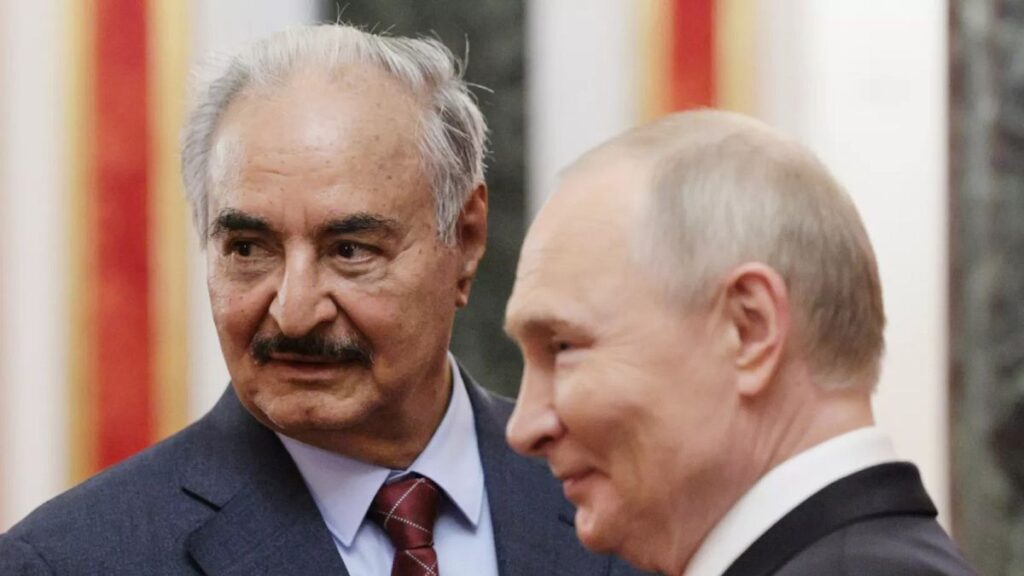The European Commission has consistently engaged with leaders from eastern Libya, including the military led by Khalifa Haftar, at a “technical level” to discuss migration management, an EU official told Euronews.
The Commission and the European border and coast guard agency Frontex are hosting a Libyan delegation on migration for two “technical visits” this week, the institution confirmed during a Friday press conference. Meetings will occur in Brussels and at Frontex headquarters in Warsaw.
The exchange will bring “all sides” of Libya and EU civil servants together in the same room. It confirmed the presence of the government of eastern Libya and its military arm, both of which are not internationally recognised. However, an EU official described sitting in the same room with the unrecognised government and its operational army as nothing new.
“We have had several technical level meetings in Brussels and Libya over the past years,” the official said.
Technical discussions are described as such because no political figures are involved, but only EU civil servants.
Discussion will be about, among others, “limiting [irregular] departures and flows through Libya in line with human rights standards,” a second EU official said.
The meetings come shortly after Libyan authorities announced plans to organise migrants’ voluntary returns, from centres under their control to the countries of origin of migrant people.
Libya remains a key country for Brussels regarding migratory flows. According to the latest Frontex data, the eastern Libya–Crete corridor saw a surge in September, with detections increasing by 280% compared to 2024. Overall departures from Libya rose by 50% compared to the previous year.
‘Friends of Putin’
Since the end of Muammar Gaddafi’s rule in 2011, the country has been politically fragmented, with contending powers engaged in a civil war and thousands of militias spread across the North African nation.
Over the years, Khalifa Haftar and his son, Saddam, have been strengthening political and military ties with Russia, culminating in Khalifa Haftar’s official visit to Moscow in May this year.
Russia has established its military presence in key parts of Libya, including the Al-Khadim airbase near Benghazi and the port of Tobruk, a frequent hub for migrant departures and the city where the main base for the eastern government and its army is located.
In this part of the country, the sea brigade called Tariq Bin Ziyad, led by Saddam Haftar, is also operating and has already intercepted migrant boats in international waters, in coordination with European authorities.
Haftar has also maintained good relations with Egypt and the UAE and has strong connections to Washington, having spent decades in exile from the Gaddafi regime in the US.
This is the first time that eastern Libyan officials are travelling to Warsaw, the headquarters of Frontex.
“There is a lot of pressure from Brussels to engage with Libya right now. Frontex will do so, but always with one message front and centre: any cooperation must respect human rights and the rule of law,” two Frontex officials confirmed to Euronews.
Unlike the European Commission, this for Frontex was the “first meeting with any Libyan officials in years,” and it is likely the first time it had contact with the eastern part of the country, one of the two Frontex officials said.
“I am not aware of any previous contacts,” the source confirmed.
“The technical visit will give the Libyan delegation a chance to familiarise themselves with Fontex’s work and its role in supporting EU countries at the external borders,” the Frontex official explains.
No longer a taboo
The EU has a long tradition of cooperation with Libyan authorities on migration issues, dating back to 2013, when the Border Assistance Mission in Libya (EUBAM) was launched.
But so far, this cooperation has entailed a partnership with the government of Tripoli.
However, in a letter dated June 2025 to the EU 27 leaders, European Commission President Ursula von der Leyen explicitly stated that it is necessary to work “with authorities in the West and East of the country” to strengthen border management and combat migrant smuggling.
Since then, the Commission has initiated diplomatic activity, supported by some EU countries, with the authorities in the East.
But the beginning of this new era of engagement presented a stumbling start.
In July, a visit to Benghazi by Commissioner for Migration Magnus Brunner with ministers of Italy, Greece and Malta ended up in a diplomatic incident, as Brunner and the European representatives were expelled.
According to an unnamed official who shared information with Euronews at the time, the European delegation refused to pose for a photo with the eastern Libyan government ahead of a meeting with Haftar’s military.
In response, government representatives fired back, declaring the Commissioner and the minister “persona non grata” and calling on them to leave the country.
Despite EU officials mentioning the respect of human rights as part of the approach in the migration management, UN agencies, civil society organisations and journalists have been constantly reporting systematic abuses, tortures and detention of migrants in all parts of Libya and in international waters, with incidents involving also rescuers and fishermen.
In July, Amnesty International described the overall EU-Libya engagement as “morally bankrupt”.
“The EU’s morally bankrupt migration cooperation with Libyan authorities amounts to complicity in horrific human rights violations. Attempts to stop departures at any cost show a complete disregard for the lives and dignity of migrants and refugees,” the organisation said.
Read the full article here
